The Art of Corporate Event Catering: Elevating Professional Gatherings

In the corporate realm, events are a cornerstone for networking, celebration, and strategic planning. The role of catering within this context cannot be overstated—it is an essential component that can significantly influence the overall success of an event. This extended guide delves deeper into the intricacies of corporate event catering, offering a comprehensive overview designed to assist organizers in executing memorable and impactful gatherings.
Understanding the Spectrum of Corporate Events
Corporate events serve a myriad of purposes, each with unique requirements and audience expectations. From intimate leadership retreats to large-scale international conferences, the scope of these events necessitates a tailored approach to catering. Understanding the event’s format—be it seminars, networking mixers, or formal award dinners—is the first step in devising a catering plan that aligns with the event’s objectives and enhances the attendee experience.
The Planning Phase: Key Considerations
Know Your Audience
The demographic profile of event attendees will significantly influence your catering choices. Factors such as age, cultural background, and professional seniority play a crucial role in menu selection and service style. A deep understanding of your audience ensures that the catering not only meets but exceeds expectations, facilitating a more engaging and inclusive event environment.
Set Clear Objectives
The purpose of the event should be the guiding light for all planning decisions, including catering. Whether the goal is to facilitate networking, celebrate company milestones, or provide educational content, the catering service should be designed to support these objectives. This strategic alignment ensures that every aspect of the event, including the meals, contributes to a cohesive and purposeful attendee experience.
Venue Logistics
The choice of venue can significantly impact your catering options. Space limitations, kitchen facilities, and vendor policies are all critical factors to consider. Early coordination with the venue is essential to identify any potential challenges and explore creative solutions, ensuring the catering service is seamless and efficient.
Budgeting Wisely
Catering can represent a substantial portion of the event budget. Effective budget management involves balancing quality and creativity with financial constraints. Transparent discussions with catering providers about budget limitations can lead to innovative solutions that maximize value without compromising the quality of the dining experience.
Crafting the Menu: A Strategic Approach
The menu is more than just a list of dishes; it’s a reflection of the event’s tone, objectives, and the organizers’ attentiveness to attendees’ needs. The following strategies are crucial in crafting a menu that resonates with the event’s essence.
Diverse and Inclusive Options
In today’s globalized world, dietary considerations are more important than ever. Offering a range of dietary options ensures all attendees feel valued and accommodated, fostering a more inclusive event atmosphere.
Seasonal and Local
Utilizing seasonal and locally sourced ingredients not only enhances the freshness and flavor of the dishes but also demonstrates a commitment to sustainability and support for local communities.
Thematic Elements
For events with a specific theme, a menu that complements the theme can significantly enhance the attendee experience. This thematic alignment can transform dining from a routine part of the event into an immersive and memorable experience.
Presentation Matters
The visual presentation of the food plays a critical role in the overall dining experience. Creative and thoughtful presentations can elevate the perceived value of the meal, stimulate conversation, and contribute to a more dynamic event atmosphere.
Execution Excellence: The Role of Professional Caterers
Selecting the right catering partner is crucial. Experienced caterers bring a wealth of knowledge and expertise, ensuring that the menu is not only delicious but also strategically aligned with the event’s goals. Collaboration with caterers should extend beyond menu planning to include discussions on service style, logistical considerations, and customization options to create a truly tailored catering solution.
Sustainability and Responsibility in Catering
Sustainability in catering encompasses a range of practices, from minimizing food waste to sourcing eco-friendly ingredients. Choosing a catering partner who prioritizes these practices demonstrates a commitment to environmental responsibility and can positively influence the overall perception of the event.
The Role of Technology in Modern Event Catering
Technology is transforming the catering industry, offering tools to enhance efficiency, customization, and guest engagement. Digital platforms for menu selection, real-time feedback mechanisms, and innovative food delivery solutions are just a few examples of how technology can be leveraged to elevate the catering experience.
Conclusion:
The importance of catering to the success of corporate events cannot be overstated. It offers a unique opportunity to enhance the attendee experience, support event objectives, and leave a lasting impression. Through careful planning, strategic menu design, and collaboration with experienced catering professionals, organizers can elevate their events, ensuring they are not only successful but also memorable.




